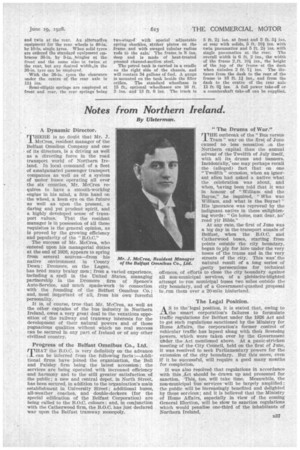Notes from Northern Ireland.
Page 63

If you've noticed an error in this article please click here to report it so we can fix it.
By Ulsterman.
A Dynamic Director.
THERE is no doubt that Mr. J. McCrea, resident manager of the Belfast. Omnibus Company and one of its directors, is a driving as well as a directing force in the road transport world of Northern Ireland. In local command of a fleet of amalgamated passenger transport companies as well as of a system of motor buses operating all over the six counties, Mr. McCrea requires to have a smooth-working engine in his mind, a firm hand on the wheel, a keen eye on the future as well as upon the present, a daring and yet prudent spirit, and a highly developed sense of transport values. That the resident manager is in possession of all these requisites is the general opinion, as is proved by the growing efficiency and popularity of the " B.O.C."
The success of Mr. McCrea, who entered upon his managerial duties at the end of 1926, appears to spring from several sources—from his native environment in County Down: Dromore, on the Lagan, has bred many brainy men ; from a varied experience, including a spell in the United States, managing partnership in the Dromore firm of Spence's Auto-Service, and much spade-work -in connection with the founding of the Belfast Omnibus Co.; and, most imp.ortant of all, from his own forceful personality.
It is, of course, true that Mr. McCrea, as well as the other captains of the bus industry in Northern Ireland, owes a very great deal to the vexatious opposition of the railway and tramway interests for the development of their natural powers and of those pugnacious qualities without which no real success can be secured in any part of Ireland or of any other civilized country.
Progress of the Belfast Omnibus Co., Ltd.
ITIHAT the B.O.C. is very definitely on the advance 1_ can be inferred from the following facts :—Additonal firms have joined the organization, the Bell and Paisley firm being the latest accession; the services are being operated with increased efficiency and harmony and to the still greater Satisfaction of the public ; a new and central depot, in North Street, has been secured, in addition to the organization's main establishment in University Street ; additional buses, all-weather coaches, and double-deckers (for the special edification of the Belfast Corporation) are being called to the B.O.C. colours ; and, in conjunction with the Catherwood firm, the B.O.C. has just declared war upon the Belfast tramway monopoly.
"The Drums of War."
THE outbreak of the "Bus versus Tram" war on the first a June caused no less sensation" in the Northern capital than the annual advent of the Twelfth of July itself, with all its drums and banners. Incidentally, one may perhaps recall the (alleged) fact that on one "Twelfth" occasion, when an ignorant alien had asked a native what the celebration was about, and when, having been told that it was in honour of "William and the Boyne,-" he inquired, "Who was William, and what is the Boyne?" His ignorance was reproved by the indignant native in these enlightening words: "Go home, man dear, an' read yir Bible."
At any rate, the first of June was a big day in the transport annals of Belfast, when the B.O.C. and Catherwood buses, starting from points outside the city boundary, began to ply for hire under the very noses of the trams and in the very streets of the city. This was the natural result of a long series of 4petty persecutions for technical offences, of efforts to close the city bounda-ry against all non-municipal services, of a plebiscite-blighted attempt to run municipal buses two miles outside the city boundary, and of a Government-quashed proposal to run them over a 20-mile hinterland.
The Legal Position.
As to the legal position, it is stated that, owing to the smart corporation's failures to formulate traffic regulations t or Belfast under the 1926 Act and to get such regulations sanctioned by the Ministry for Home Affairs, the corporation's former control of vehicular traffic has lapsed along with theit licensing powers, which were taken over by the Government under the Act mentioned above. At a panic-stricken meeting of the City Council, held on the first of June, it was resolved to seek Parliamentary powers for the extension of the city boundary. But this move, even if it be successful, will require a good many months for completion.
It was also resolved that regulations in accordance with this ,2Cct should be drawn up and presented for sanction. This, too, will take time. Meanwhile, the non-municipal bus services -will be largely amplified; the public will be increasingly benefited and delighted by those services ; and it is believed that the Ministry of Home Affairs, especially in view of the coming General Election, will be slow to sanction regulations which would penalise one-third of the inhabitants of Northern Ireland,




















































































































